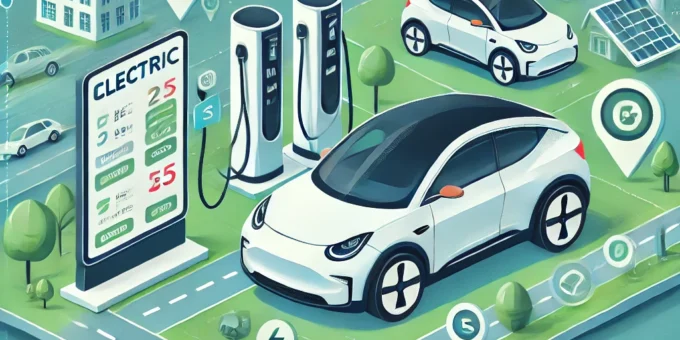
One of the key advantages of owning an electric vehicle (EV) is the growing availability of charging stations. However, not all charging stations are created equal. Factors like cost, charging speed, availability, and compatibility with your EV can make a big difference when deciding where to plug in.
This guide will show you how to compare electric vehicle charging stations near you, helping you choose the best option for your needs while optimizing cost, convenience, and charging speed.
Types of EV Charging Stations
Before comparing charging stations, it’s essential to understand the three main types available:
- Level 1 Chargers:
- Use a standard 120-volt outlet.
- Best for overnight charging at home.
- Charging Speed: 3–5 miles of range per hour.
- Level 2 Chargers:
- Use a 240-volt outlet or dedicated charging station.
- Ideal for workplaces, public areas, and faster home charging.
- Charging Speed: 15–40 miles of range per hour.
- DC Fast Chargers:
- Provide rapid charging using high-voltage direct current.
- Found at highway rest stops and major charging hubs.
- Charging Speed: 100–200+ miles of range in 20–40 minutes.
Factors to Consider When Comparing Charging Stations
When choosing a charging station, keep these factors in mind:
- Cost: How much does it cost per kilowatt-hour (kWh), or is it free?
- Speed: Is the charger a Level 2 or DC fast charger?
- Location: Is it conveniently located near your route, workplace, or home?
- Availability: How many chargers are available at the station, and what’s the wait time?
- Compatibility: Does the station support your EV’s charging port (e.g., CCS, CHAdeMO, Tesla)?
Understanding Charging Speed (kW)
Charging speed is measured in kilowatts (kW) and determines how quickly your EV can recharge.
- Level 2 Chargers: Typically offer 7–22 kW, which adds about 20–40 miles of range per hour.
- DC Fast Chargers: Range from 50–350 kW, with higher-powered chargers replenishing range faster.
Tip: Always check your EV’s maximum charging rate, as it may limit how much power it can draw from a high-speed charger.
Major EV Charging Networks
Here’s a quick overview of popular EV charging networks:
- Tesla Superchargers: Exclusive to Tesla vehicles, offering fast and reliable charging.
- Electrify America: Compatible with most EVs, featuring ultra-fast DC chargers up to 350 kW.
- ChargePoint: One of the largest networks, offering Level 2 and some DC fast chargers.
- EVgo: Focuses on urban areas with fast-charging options.
- Blink: Offers a mix of Level 2 and DC fast chargers at retail locations.
How to Find Charging Stations Near You
The best way to locate nearby charging stations is to use apps and tools like:
- PlugShare: Displays station locations, real-time availability, and user reviews.
- A Better Routeplanner (ABRP): Ideal for planning long trips with optimized charging stops.
- Google Maps: Includes EV charging stations in its navigation features.
Comparing Charging Costs
Charging costs vary depending on the network, location, and charger type. Common pricing structures include:
- Pay-Per-Use: Pay based on the amount of energy consumed (e.g., $0.30/kWh).
- Subscription Plans: Monthly memberships offering lower rates (e.g., Electrify America’s Pass+).
- Free Charging: Some businesses, like hotels and grocery stores, offer free Level 2 charging for customers.
Station Availability and Real-Time Status
Apps like PlugShare and EVgo show real-time charger availability to help you avoid crowded stations. Features to look for include:
- Number of chargers at the location.
- Current usage (e.g., occupied or available).
- Estimated wait times.
Compatibility with Your EV
Ensure the station supports your EV’s charging port:
- CCS (Combined Charging System): Common for most non-Tesla EVs.
- CHAdeMO: Used by older Nissan Leafs and some other models.
- Tesla Connectors: Exclusive to Tesla vehicles, though Tesla adapters can allow other EVs to use the network.
Amenities at Charging Stations
Long charging stops are more enjoyable with access to nearby amenities. Look for stations near:
- Restaurants and coffee shops.
- Restrooms.
- Wi-Fi or seating areas.
Membership Plans and Discounts
Many networks offer membership programs to reduce charging costs. For example:
- Electrify America Pass+: $4/month for lower per-kWh rates.
- EVgo Membership: Discounted pricing for frequent users.
Charging Station Safety Tips
- Park correctly to avoid blocking others.
- Secure charging cables to prevent tripping hazards.
- Avoid charging in extreme weather without a sheltered station.
Traveling with EVs: Planning Ahead
For long-distance trips, use tools like ABRP to plan charging stops based on your EV’s range and real-time charger availability.
FAQs About EV Charging Stations
How much does it cost to charge at a public station?
What’s the difference between Level 2 and DC fast charging?
Are free charging stations reliable?
How can I find the nearest fast charger?
Can non-Tesla EVs use Tesla Superchargers?
Comparing electric vehicle charging stations near you ensures you get the best charging experience while saving time and money. By considering factors like cost, speed, location, and compatibility, you can make informed decisions that fit your driving needs.
Whether you’re charging locally or planning a cross-country road trip, the growing availability of EV charging infrastructure makes owning an electric vehicle more convenient than ever. Start exploring your options today, and enjoy the benefits of clean, efficient driving!